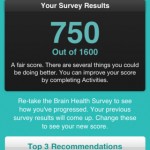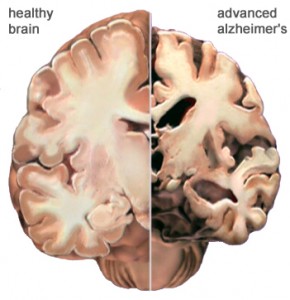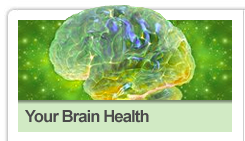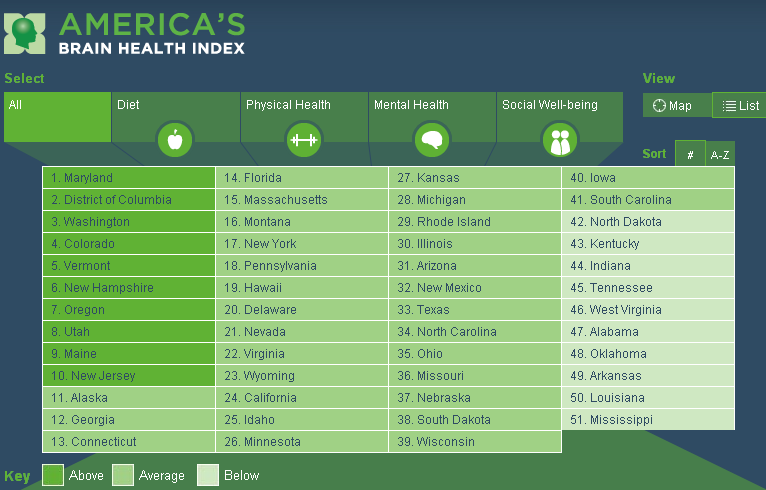Use the Latest Science to Maintain Brain Health
 Do you have an iPhone or iPad and want to lower your risk of Alzheimer’s disease or other forms of dementia? Check out the the free BrainyApp. It let’s you apply the latest neuroscience to assess your risk and develop recommendations for keeping your brain and heart healthy.
Do you have an iPhone or iPad and want to lower your risk of Alzheimer’s disease or other forms of dementia? Check out the the free BrainyApp. It let’s you apply the latest neuroscience to assess your risk and develop recommendations for keeping your brain and heart healthy.
Not surprisingly the risk factors that the app uses are related to lifestyle and include diet, smoking, blood pressure, weight exercises and lack of mental activity. And the factors work together. For example, one study found that high salt diet combined with inactivity in older adults contributed to cognitive decline.
Interested to hear from readers that have used this app or similar apps to gain insight into how lifestyle choices impact brain health.
Categories: Cognitive Decline, Lifestyle, Older Adult, Software Tags:
Will Playing Video Games Boost Kid’s Creativity?
 The answer is yes according to recent research at Michigan State University. They studied 500 12-year-olds and found that playing video games increases creativity when it comes to drawing pictures and writing stories. The finding is robust:
The answer is yes according to recent research at Michigan State University. They studied 500 12-year-olds and found that playing video games increases creativity when it comes to drawing pictures and writing stories. The finding is robust:
“… regardless of gender, race or type of game played by the students, the study found a relation between video game playing and greater creativity.”
They also found no increase in creativity through the use of computers, the Internet or smart phones.
Interested to hear from readers that include video game playing in an effort to develop their children’s brain function and cognitive performance.
Categories: Child, Problem Solving, Software Tags: creativity, games
21st Century Problem Solving Skills for Students
 For more than 25 years Designation ImagiNation has delivered an after school experience that builds creativity, critical thinking and collaborative problem solving skills in k-12 and university level students in more than 30 countries. Students form small teams of 2-7 members, select an open-ended challenge, learn to generate and test creative solutions and then compete in tournaments. They reach over a 100,000 students a year and the tournaments are a significant event. Check out the 2011 global finals. I’ve included a photo (to the right) from the opening ceremonies in this post.
For more than 25 years Designation ImagiNation has delivered an after school experience that builds creativity, critical thinking and collaborative problem solving skills in k-12 and university level students in more than 30 countries. Students form small teams of 2-7 members, select an open-ended challenge, learn to generate and test creative solutions and then compete in tournaments. They reach over a 100,000 students a year and the tournaments are a significant event. Check out the 2011 global finals. I’ve included a photo (to the right) from the opening ceremonies in this post.
Some challenges include:
- Deliver a theatrical performance on the use of solar energy
- Create a movie trailer with characters from at least two nations
- Design and build a wooden and glue structure that can hold a heavy weigh
Here is the pitch:
“By participating in the team-based competitive program, children can achieve lifelong benefits, improve self confidence, and learn the creative problem solving process and develop critical thinking skills.”
There are plenty of opportunities to start a team, sponsor a team or volunteer.
Interested to hear from readers that have participated in the program. How are they teaching creativity and critical reasoning skills?
Categories: Child, Problem Solving Tags:
Brain Training With Riddles – Does it Work?
 Working riddles makes you to think. Often you have to think hard or in new ways. Riddles are good at teaching us how to reframe a context, probe deeply on small clues, invert our assumptions and other problem solving heuristics. Some claim they are a great brain training tool. For example, I recently came across Riddles Improve Brain Functionality, Translate to Real-Life Problem Solving Skills, that claims:
Working riddles makes you to think. Often you have to think hard or in new ways. Riddles are good at teaching us how to reframe a context, probe deeply on small clues, invert our assumptions and other problem solving heuristics. Some claim they are a great brain training tool. For example, I recently came across Riddles Improve Brain Functionality, Translate to Real-Life Problem Solving Skills, that claims:
“A daily dose of riddles and brain teasers is one of the most effective ways to exercise the mind. It is proven that by spending just a few minutes a day “playing” improves memory, concentration and reaction time. This improved brain power translates into being more efficient as a parent, student, employee or boss.”
While I have yet to find a scientific study that supports the claim that working riddles significantly improves cognitive performance on everyday tasks, it does seem reasonable.
Try some out. Riddlesly (source of the quote above) is a popular site. Or for $15 you can get visual brainstorms from Marbles the brain store. Visual brainstorms is a deck of 100 cards with riddles of various types of levels.
Interested to hear from readers that use riddles as part of their Next brain training program.
Categories: Memory and Learning, Problem Solving Tags:
Can the ABCs Unblock Your Mental Performance?
 Cognitive Behavioral Therapy (CBT) has seen a lot of success over the last 25 years. The ideas is that faulty assumptions or patterns of thinking can seriously impair how we learn, make decisions, socialize or otherwise perform cognitive functions. In CBT the therapist works with the patient to surface the faulty pattern of thinking and change it thereby relieving the problems. The tools of CBT have been incorporated in other disciplines such as leadership, design and self improvement.
Cognitive Behavioral Therapy (CBT) has seen a lot of success over the last 25 years. The ideas is that faulty assumptions or patterns of thinking can seriously impair how we learn, make decisions, socialize or otherwise perform cognitive functions. In CBT the therapist works with the patient to surface the faulty pattern of thinking and change it thereby relieving the problems. The tools of CBT have been incorporated in other disciplines such as leadership, design and self improvement.
As a self-improvement approach the individual attempts to surface and alter faulty assumptions pretty much on their own. While the success of the self-improvement approach has not been scientific demonstrated it does seem to have staying power. More and more books, programs and training events are aimed at how individuals can use CBT to manage their owning thinking and improve cognitive performance. Such programs are typically focused on learning:
- The ABC formula (see diagram) or the connection between activating events, the beliefs they generate and the emotional consequent or feeling we have
- How to analyze self talk especially those messages we repeat
- Ways to identify patterns of dysfunctional thinking (e.g. over generalizing or catastrophizing)
- Techniques for modifying the patterns (e.g. confronting and flooding).
For example you can use this approach to identify and mitigate the negative self-talk that stops you from taking action, making a difficult decision or giving a presentation. To explore CBT further you can work through a short online presentation developed by James Porter or check out CBT for Dummies.
Interested to hear from readers that have used CBT by themselves or with a therapist to improve cognitive performance.
Source: ABC Diagram
Categories: Books, Manage Emotions, Mental Focus, Training Tags:
Brain Health Becomes Top Economic Issue
 Just read an interesting blog post claiming that the cost of brain disorders in Europe has soared to $1 trillion dollars per year! The post in based on research from the European Brain Council and covers a wide range of issues from strokes and depression to sleep problems and headaches.
Just read an interesting blog post claiming that the cost of brain disorders in Europe has soared to $1 trillion dollars per year! The post in based on research from the European Brain Council and covers a wide range of issues from strokes and depression to sleep problems and headaches.
The lack of brain health is now the most costly of all chronic conditions in Europe even topping heart disease and cancer.
While the article points to tougher regulation on pharmaceutical in Europe as part of the problem, the costs are enormous in the US too.
This signals an urgent need for individual action and behavior change around diet, supplements, exercise, brain training, socializing, personal mood management and the other factors that have proven effective in enhancing and maintaining brain health even as we age.
Image Source: Alzheimer’s Association
Categories: Cognitive Decline Tags:
More than 50% of Brain Health is up to You!
 At least that is the conclusion from a review of the current state of research described on the Beautiful Minds website. The site is a educational effort by the National Center for Creative Aging and Martek Biosciences Corporation. They define brain health in terms of four dimensions:
At least that is the conclusion from a review of the current state of research described on the Beautiful Minds website. The site is a educational effort by the National Center for Creative Aging and Martek Biosciences Corporation. They define brain health in terms of four dimensions:
- The nourished mind
- The mentally engaged mind
- The socially connect mind
- The physically active mind
They have a quiz you can take to see where you stand and have even developed a brain health index for all 51 states.
As you can see Maryland is ranked #1 and Mississippi is ranked last. When you go to the site you can click on each state and get more details including an analysis of strengths and weaknesses.
All the tips they offer have been covered elsewhere on the Next Brain blog but it is useful to review them. The site also offers inspirational stories, a beautiful mind contest and resources for the healthcare professional. Check it out and let me know what is most useful.
Categories: Cognitive Decline, Diet, Lifestyle, Older Adult Tags:
Walnuts Boost Critical Thinking Skills By 11%
 Researchers at Andrews University have found a potential connection between eating walnuts and improved critical reasoning skills in young adults. They published their findings in the British Journal of Nutrition. The bottom line:
Researchers at Andrews University have found a potential connection between eating walnuts and improved critical reasoning skills in young adults. They published their findings in the British Journal of Nutrition. The bottom line:
“Students consuming walnuts showed a significant improvement in inference after consuming one-half cup of walnuts daily for eight weeks,” says Pribis. “Walnuts will obviously not make you a critical thinker; this comes after years of studying. However, students and young professionals in fields that involve a great deal of critical thinking or decision-making could benefit from regularly eating walnuts.”
Significant improvement in this case means scoring 11% higher on a verbal inferential reasoning task. Walnuts were ground up and consumed by having two sliced of banana bread every day.
We have reported on additional claims that walnuts provide a cognitive boost elsewhere on the Next Brain blog
I am interested to hear from readers that use walnuts to improve brain function or cognitive performance. How many do you eat and how often? How do you consume them – raw or as an ingredient in some other food?
Categories: Cognitive Decline, College Student, Diet, Problem Solving Tags:
Do ADHD Meds Make Healthy People Smarter?
Many of the emails I get about building a Next Brain have to do with drugs, especially medication prescribed for attention deficit hyperactivity disorder or ADHD. Readers want to know if there is evidence to support the claim that people without ADHD that still use drugs like Adderall will experience improved brain function and enhanced cognitive performance.
Important note: Using medications outside of the boundaries of their prescription or using medications without a prescription can be unsafe and illegal.
 The 2011 September issue of the Psychological Bulletin has taken this question up with articles on who takes so-called smart pills and what kind of effects they are having. My favorite paper,
The 2011 September issue of the Psychological Bulletin has taken this question up with articles on who takes so-called smart pills and what kind of effects they are having. My favorite paper,
reviews results from over 40 studies finds:
“The cognitive effects of stimulants on normal healthy people cannot yet be characterized definitively, despite the volume of research that has been carried out on these issues. Published evidence suggests that declarative memory can be improved by stimulants, with some evidence consistent with enhanced consolidation of memories. Effects on the executive functions of working memory and cognitive control are less reliable but have been found for at least some individuals on some tasks.”
In short there is some evidence for improved learning by memorizing (simple list of items) but doubt about significant improvement on working memory (how much information you can attend to at one) or self control.
More research is in the works but early results signal that the smart pill in its current form is not a silver bullet for the Next Brain.
Categories: College Student, Executive Function, Mental Focus Tags: smart drugs
Simple Rules Immediately Boost Math Brain
 Learning or relearning the basics of arithmetic – or how to add, subtract, multiply and divide numbers – is painful for most. With calculators everywhere some ask why even learn arithmetic?
Learning or relearning the basics of arithmetic – or how to add, subtract, multiply and divide numbers – is painful for most. With calculators everywhere some ask why even learn arithmetic?
Arithmetic is a core skill in a broader competency called numeracy or how we think quantitatively or with numbers. Quantitative literacy is important for success in a wide variety of careers and household projects, even if you use a calculator! Turns out that learning arithmetic (when done right) is excellent brain training and a foundation for quantitative literacy.
One key – see patterns in numbers using simple rules.
For example, can you complete 98 x 97 = ? in five seconds without a calculator? How about without paper and pencil?
This YouTube video will teach you how to do the problem and similar ones in just a few minutes. A snapshot is given below.
This is just one example of how a simple rule will immediately boost you math skills and build your brain. Of course you need to practice to get it to stick. There are many such rules and even some math programs for sale that teach them. The video above comes from Glad2Teach that also offers a similar approach to algebra. Another program that combines simple rules with memory building and fun is Brainetics.
Even if you already know arithmetic, such programs offer 10-15 minute daily exercises for training your math brain and building quantitative competency.
Very interested to hear from readers with experience using programs that teach simple rules for doing complex arithmetic problems by looking for patterns in numbers.
Categories: Child, Cognitive Development, Memory and Learning, Mental Focus, Training Tags:




